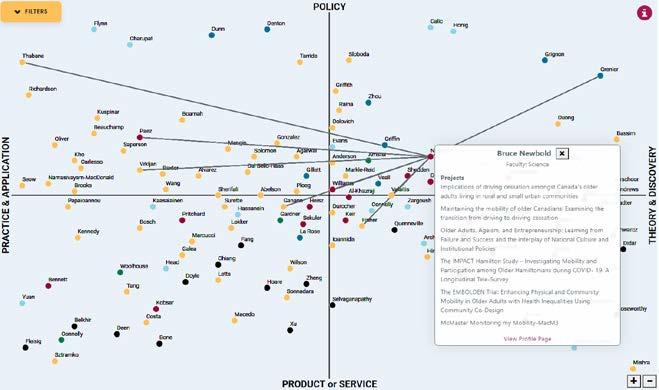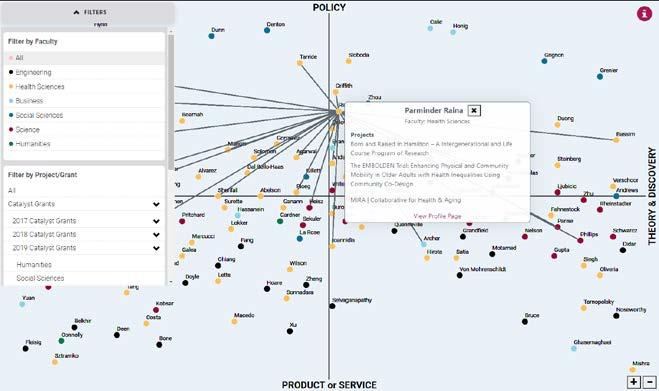
3 minute read
An interdisciplinary approach to research
Interdisciplinary research and design thinking
MIRA takes an interdisciplinary approach to examining the biological, behavioural, technological and environmental factors affecting how people age, by combining the following:
Advertisement
A coordinated, collaborative research agenda that brings together academic researchers and clinicians from all Faculties;
The use of a design thinking approach to generate human-centered solutions;
Ongoing interaction with diverse stakeholders in all of MIRA’s work.
Design thinking: MIRA's approach to research
Design thinking is a formal method of solution-focused thinking. Rather than working to solve a specific problem, it starts with a goal and explores multiple, alternative solutions simultaneously. It is an especially useful method to investigate ill-defined problems where many factors may be unknown. This approach is collaborative and integrates end users (community members and other stakeholders) from the project outset to ensure that every possible perspective is considered.
Design thinking provides a framework where ideas are created through a dynamic, iterative process within a ‘system of spaces’ (inspiration, ideation, and implementation), as opposed to an orderly (linear) set of steps, which is commonly employed in traditional approaches to innovation and design. Within these spaces, individuals trained in a variety of disparate disciplines collaborate to observe, evaluate and work directly with users to determine innovations that come from understanding the problem.
In the context of aging, innovations could include, but are not limited to, assistive devices or technologies (products), clinical or caregiver-targeted programs (services), and/or other interventions (e.g., changes in urban design). Such research can involve basic science research labs that act as centralized knowledge-generating hubs and population-based cohorts that improve our understanding of mechanisms at the cellular and population levels, while involving stakeholders to accelerate discovery and its adoption in practice.
MIRA’s approach to research is based on this design thinking philosophy. MIRA believes approaches that engage older adults, their families, health care providers and other partners through each stage— from research and evaluation to implementation of interventions and technologies—are key to delivering solutions that have real-world impact.
With an aim to explore and promote the use of co-design methods in aging research both within and beyond McMaster University, MIRA has consulted and collaborated with experts such as Dr. Robert Fleisig (McMaster, Faculty of Engineering), Dr. Harry Mahler (OCADU, Toronto), and Dr. P.J. White (IT Carlow, Ireland) whose current involvement is centred on MIRA’s Idea Exchange series to support MIRA researchers through the COVID-19 pandemic.
Interdisciplinary research map

In consultation with research support facilitators in all six Faculties, MIRA has spent the last several years developing a Research Map to illustrate the focus and impact of individual MIRA researchers’ work. MIRA researchers have positioned themselves on the two-dimensional plot; the X-axis represents their research focus, ranging from theory and discovery to practice and application, and the Y-axis represents their research output (ranging from products/ services at the bottom, to academic in the middle, and to policy at the top). Members are colour coded by Faculty. The map is intended to facilitate connections by highlighting areas of strength and opportunity among MIRA members, while enabling them to view themselves as part of a broader community.
Over the past year, MIRA partnered with the McMaster Library’s Experts platform and McMaster’s Research & High-Performance Computing Support (RHPCS) team to transform this map into an interactive tool that will allow users to see how MIRA researchers are connected to each other and to MIRA’s research projects and initiatives. This interactive and dynamic project was completed in 2020.

- Jason Brodeur, Associate Director, Digital Scholarship Services










